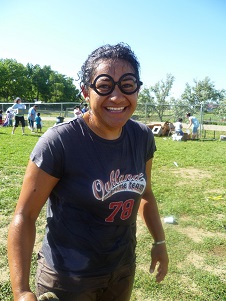
Ula Atatagi
Within a year Vaoula (Ula) Atatagi went from being adamant postgraduate study wasn't for her to deciding a Master's degree from the University of Otago's National Centre of Peace and Conflict Studies (NCPACS) was “the only option”.
Ula worked for 10 years as a New Zealand Police Officer, including a stint in the Regional Assistance Mission to Solomon Islands (RAMSI), and has volunteered in Kenya (in a community for refugees internally displaced after conflicts in 2007) and the USA (within the Cheyenne River Youth Programme).
Changing life direction
A desire to change her life's direction, plus an “adopted grandmother's” long standing opinion that Ula should undertake university studies, inspired to her to do a BA in Development Studies and International Relations. The notion of further study only appealed after she discovered Otago's Master of Peace and Conflict Studies was a year-long course with an option of either a dissertation or a practical component.
“Considering my undergraduate degree, former profession, travel and other life experience, a practicum seemed an obvious choice,” Ula says. “It will take me to Timor Leste. I spent the 2013/2014 summer there working at a government and grass roots level. I'm still working on whether my practicum will be community-based or with a governmental organisation that deals with conflict.
Support on offer
“Now that I'm here, postgrad at NCPACS is the only option for me, and I'm grateful for the opportunity. Centre Administrator Rosemary McBryde is genuinely supportive, and the academic staff are so encouraging and enthusiastic about sharing their expertise.
“When discussing ideas or asking for help – any member of staff can assist you. Staff and students, PhD and Masters, come from a mix of countries and walks of life - there is a wealth of knowledge and experiences right here!”
Find out more about the National Centre for Peace and Conflict Studies.
